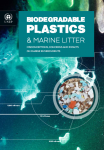 17 November 2015: The widespread adoption of ‘biodegradable’ products will not contribute to a significant decrease in the volume of plastic entering the ocean or to a decline in the chemical and physical risks that plastics pose to the marine environment, according to a report released by UN Environment Programme (UNEP) on the occasion of the 20th anniversary of the Global Programme of Action for the Protection of the Marine Environment from Land-based Activities (GPA).
17 November 2015: The widespread adoption of ‘biodegradable’ products will not contribute to a significant decrease in the volume of plastic entering the ocean or to a decline in the chemical and physical risks that plastics pose to the marine environment, according to a report released by UN Environment Programme (UNEP) on the occasion of the 20th anniversary of the Global Programme of Action for the Protection of the Marine Environment from Land-based Activities (GPA).
Approximately 280 million tonnes of plastic are produced annually around the world, according to UNEP, with only a “very small percentage” of this plastic recycled. Up to 20 million tonnes of plastic ends up in the world’s oceans annually, which results in several billion dollars each year in environmental damage to marine ecosystems. Once this plastic enters the ocean, it breaks down into microplastic particles, which are often ingested by marine organisms such as fish, seabirds and zooplankton.
The report, ‘Biodegradable Plastics and Marine Litter: Misconceptions, Concerns and Impacts on Marine Environments,’ examines whether ‘biodegradable’ plastics could play a role in reducing the negative environmental impacts of plastic pollution in the ocean. The report finds that the most common plastics are not biodegradable in marine environments; for instance, polymers that biodegrade under favorable conditions on land break up much more slowly in the ocean, contributing to marine litter and negative impacts on marine ecosystems. The report emphasizes that the complete biodegradation of plastics occurs in “conditions that are rarely, if ever, met in marine environments.”
The report also explores the impacts of labeling a product as biodegradable, suggesting such labeling attracts people because it is seen as an alternative, technological solution to the problem of marine plastic pollution. The report cautions that such labeling removes responsibility from the individual, contributing to a reluctance to take action on the problem.
“This report shows there are no quick fixes and a more responsible approach to managing the lifecycle of plastics will be needed to reduce their impacts on our oceans and ecosystems,” said UNEP Executive Director Achim Steiner. UNEP hosts the intergovernmental GPA mechanism. [UNEP Press Release] [Publication: Biodegradable Plastics and Marine Litter] [UN Press Release]